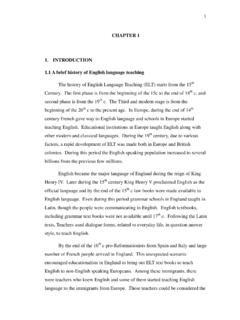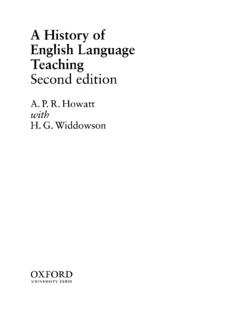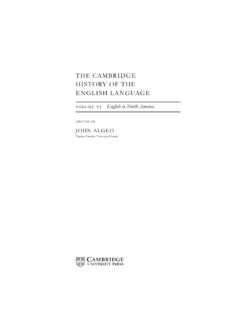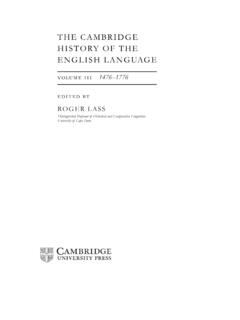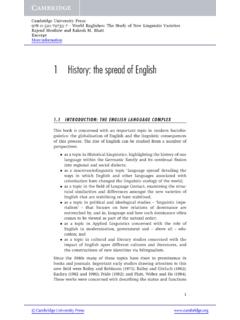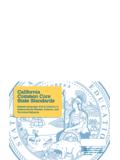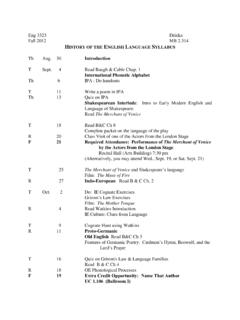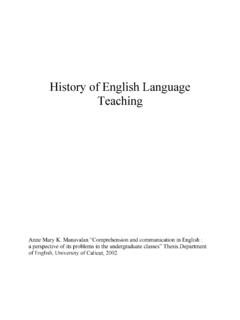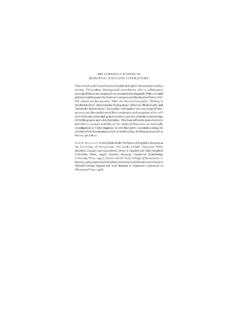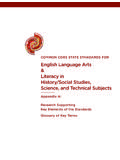Transcription of A History of the English Language - PBworks
1 A History of the English Language Fifth Edition Baugh and Cable s A History of the English Language has long been considered the standard work in the field. A History of the English Language is a comprehensive exploration of the linguistic and cultural development of English , from the Middle Ages to the present day. The book provides students with a balanced and up-to-date overview of the History of the Language . The fifth edition has been revised and updated to keep students up to date with recent developments in the field. Revisions include: a revised first chapter, English present and future a new section on gender issues and linguistic change updated material on African-American Vernacular English A student supplement for this book is available, entitled Companion to A History of the English Language .
2 Albert was Schelling Memorial Professor at the University of Pennsylvania. Thomas Cable is Jane and Roland Blumberg Centennial Professor of English at the University of Texas at Austin. THE COUNTIES OF ENGLAND A History of the English Language Fifth Edition Albert and Thomas Cable First published 1951 by Routledge & Kegan Paul Second edition 1959 Third edition 1978 Fourth edition published 1993 by Routledge Authorized British edition from the English Language edition, entitled A History of the English Language , Fifth Edition by Albert and Thomas Cable, published by Pearson Education, Inc., publishing as Prentice Hall, Inc. Copyright 2002 Routledge 11 New Fetter Lane, London EC4P 4EE Routledge is an imprint of the Taylor & Francis Group This edition published in the Taylor & Francis e-Library, 2005.
3 To purchase your own copy of this or any of Taylor & Francis or Routledge s collection of thousands of eBooks please go to All rights reserved. No part of this book may be reprinted or reproduced or utilised in any form or by any electronic, mechanical, or other means, now known or hereafter invented, including photocopying and recording, or in any information storage or retrieval system, without permission from Routledge. British Library Cataloguing in Publication Data A catalogue record for this book is available from the British Library ISBN 0-203-99463-9 Master e-book ISBN ISBN 0-415-28098-2 (hbk) ISBN 0-415-28099-0 (pbk) Contents Preface viii 1 English Present and Future 1 2 The Indo-European Family of Languages 16 3 Old English 38 4 Foreign Influences on Old English 67 5 The Norman Conquest and the Subjection of English , 1066 1200 98 6 The Reestablishment of English , 1200 1500 116 7 Middle English 146 8 The Renaissance, 1500 1650 187 9 The Appeal to Authority.
4 1650 1800 238 10 The Nineteenth Century and After 279 11 The English Language in America 331 Appendix A Specimens of the Middle English Dialects 387 Appendix B English Spelling 399 Index 406 MAPS The Counties of England ii The Home of the English 42 The Dialects of Old English 48 The Dialects of Middle English 178 The Dialects of American English 356 ILLUSTRATIONS William Bullokar s Booke At Large (1580) 196 The Editors of the New (Oxford) English Dictionary 321 Extract from the Oxford English Dictionary 323 The American Spelling Book of Noah Webster 353 Preface Before the present author ever became associated with Albert s A History of the English Language , several generations of teachers and students had appreciated its enduring qualities.
5 Not least of these, and often remarked upon, was the full attention paid to the historical and cultural setting of the development of the Language . This original emphasis has made it possible for subsequent editions to include discussions of current issues and varieties of English in ways that could not have been specifically foreseen in 1935. The fifth edition continues this updating by expanding the sections on African American Varnacular English and Hispanic American English , adding a section on Gender Issues and Linguistic Change, and incorporating small changes throughout. Once again global events have affected global English and necessitated revisions, especially in the first and last chapters. Baugh s original text was supported by footnotes and bibliographies that not only acknowledged the sources of his narrative but also pointed directions for further study and research.
6 In each successive edition new references have been added. To avoid documentary growth, sprawl, and incoherence by simple accretion, the present edition eliminates a number of references that have clearly been susperseded. At the same time it keeps many that might not usually be consulted by students in order to give a sense of the foundations and progress of the study of the subject. In the first edition Baugh stated his aim as follows: The present book, intended primarily for college students, aims to present the historical development of English in such a way as to preserve a proper balance between what may be called internal History sounds and inflections and external History the political, social, and intellectual forces that have determined the course of that development at different periods.
7 The writer is convinced that the soundest basis for an undersanding of present-day English and for an enlightened attitude towards questions affecting the Language today is a knowledge of the path which it has pursued in becoming what it is. For this reason equal attention has been paid to its earlier and its later stages. As in previous editions, the original plan and purpose have not been altered. The various developments of linguistic inquiry and theory during the half century after the History s original publication have made parts of its exposition seem to some readers overly traditional. However, a History presented through the lens of a single theory is narrow when the theory is current, and dated when the theory is superseded. Numerous other histories of English have made intelligent use of a particular theory of phonemics, or of a specific version of syntactic deep and surface structure, or of variable rules, or of other ideas that have come and gone.
8 There is nothing hostile to an overall linguistic theory or to new discoveries in Baugh s original work, but its format allows the easy adjustment of separable parts. It is a pity that a new preface by convention loses the expression of thanks to colleagues whose suggestions made the previous edition a better book. The fifth edition has especially benefited from astute comments by Traugott Lawler and William Kretzschmar. The author as ever is sustained by the cartoonist perspective of Carole Cable, who he trusts will find nothing in the present effort to serve as grist for her gentle satiric mill. A History of the English Language PHONETIC SYMBOLS [a] in father [a] in French la in not in England (a sound between [a] and ) [ ] in mat [ ] in met [e] in mate [I] in sit [i] in meat in law [o] in note [U] in book [u] in boot [ ] in but [ ] in about [y] in German f r [eI] in play [oU] in so [aI] in line [aU] in house in boy [ ] in sing [ ] in thin [ ] in then [ ] in shoe [ ] in azure [j] in you [ ] enclose phonetic symbols and transcriptions.
9 : after a symbol indicates that the sound is long. before a syllable indicates primary stress: [ b v] above. In other than phonetic transcriptions and indicate open vowels, and indicate close vowels. * denotes a hypothetical form. > denotes develops into ; < is derived from . 1 English Present and Future 1. The History of the English Language as a Cultural Subject. It was observed by that remarkable twelfth-century chronicler Henry of Huntington that an interest in the past was one of the distinguishing characteristics of humans as compared with the other animals. The medium by which speakers of a Language communicate their thoughts and feelings to others, the tool with which they conduct their business or the government of millions of people, the vehicle by which has been transmitted the science, the philosophy, the poetry of the culture is surely worthy of study.
10 It is not to be expected that everyone should be a philologist or should master the technicalities of linguistic science. But it is reasonable to assume that a liberally educated person should know something of the structure of his or her Language , its position in the world and its relation to other tongues, the wealth of its vocabulary together with the sources from which that vocabulary has been and is being enriched, and the complex relationships among the many different varieties of speech that are gathered under the single name of the English Language . The diversity of cultures that find expression in it is a reminder that the History of English is a story of cultures in contact during the past 1,500 years. It understates matters to say that political, economic, and social forces influence a Language .
